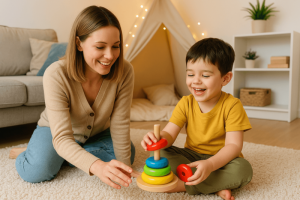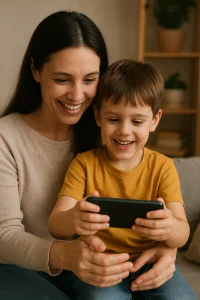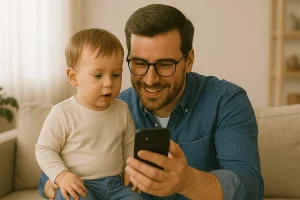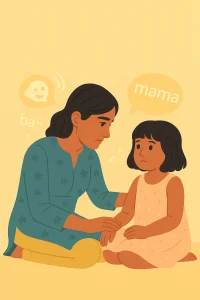Strengthen Your Marriage: Is Counseling Right for You?
By Prapoorna M
Last Updated: April 22, 2024
In the journey of marriage, facing challenges is common, yet many hesitate to seek help through marriage counseling or couples therapy. This hesitation often stems from misconceptions that it signals failure or the end. However, engaging in therapy is a proactive and strong step towards strengthening your bond, not a sign of defeat. It’s a commitment to improving your relationship’s health and overcoming hurdles together. Recognizing when it’s time to seek professional help can be crucial. Whether it’s constant misunderstandings, lingering conflicts, or growing distance, understanding these signs can lead to a deeper, more fulfilling partnership.
Read here to learn about Save Your Marriage: Is Marriage Counseling Right for You?
Understanding the Need for Marriage Counseling
The Reality of Marital Challenges
Marriage, a journey shared between two people, is filled with its own set of ups and downs. Despite what picture-perfect images on social media may suggest, no relationship is immune to conflicts. From minor disagreements over chores to the more profound differences in life goals and values, challenges are a universal aspect of sharing your life with someone.
But here’s the twist – facing challenges together doesn’t have to be a negative experience. In fact, addressing these issues head-on can significantly strengthen your bond. Think of it as relationship maintenance; just as you would service a car to keep it running smoothly, tackling marital challenges together keeps your relationship healthy and resilient.
Read here to learn about: Marriage counseling: Everything you need to know
Primary Signs It’s Time for Counseling
When does the usual ebb and flow of a relationship signal that it might be time to seek outside help? Recognizing the “Marriage Counseling Signs” can be your first step toward a healthier and stronger relationship. Here are some critical indicators that suggest it might be time to consider couples therapy:
- Communication Breakdown: When conversations consistently end in arguments or, worse, silence, it’s a sign that the communication lines are breaking down. Remember, it’s not just about talking; it’s about understanding each other.
- Emotional Withdrawal: If you or your partner start to feel more like roommates than a couple, it indicates a significant emotional distance. This withdrawal can manifest as spending less time together, showing less affection, or a lack of interest in each other’s lives.
- Trust Issues: Trust is the foundation of any relationship. If jealousy, secrecy, or infidelity has shaken this foundation, it’s crucial to address these issues before they become insurmountable.
- Constant Conflict: It’s normal to have disagreements. However, if conflicts become the norm rather than the exception, or if they’re never fully resolved, these are clear signs help is needed.
- Lack of Intimacy: A decrease in physical intimacy is not uncommon, especially in long-term relationships. However, when the distance starts affecting your emotional connection, it’s time to take action.
- Considering Separation: If thoughts of separation or divorce begin to surface, it’s a critical signal that immediate action is required to address the underlying issues.
Addressing these signs early with the help of marriage counseling can not only salvage your relationship but can also transform it into a more profound and meaningful partnership.
Recognizing the Signs in Your Relationship
Navigating the ups and downs of a relationship can sometimes feel like steering a ship through stormy seas. Recognizing when those waves are signaling a deeper issue is crucial to maintaining a healthy relationship. Let’s explore some of the signs that indicate it might be time to seek guidance.
1. Frequent and Intense Arguments
Arguments are a natural aspect of any relationship, offering opportunities for growth and understanding. However, when these disagreements become the main form of communication, it’s a red flag. Frequent and intense arguments can chip away at the foundation of trust and respect that your relationship is built on. They often escalate from trivial matters to significant disputes, leaving both parties feeling misunderstood and undervalued. This cycle of conflict can be a sign that underlying issues are not being addressed, making it a crucial time to consider couples counseling.
2. Communication Breakdown
The cornerstone of any strong relationship is effective communication. It’s not just about talking but about truly understanding each other’s perspectives, needs, and feelings. When communication breaks down, it’s often marked by:
- Conversations that lead to nowhere or end in arguments
- Feeling unheard or misunderstood by your partner
- Avoiding discussions to prevent conflict
- Silence becoming a comfortable alternative to talking
These signs indicate a significant gap in your ability to connect and empathize with each other. Couples therapy can provide strategies to bridge this gap, fostering a healthier and more understanding relationship.
Know more: Better ways to communicate in relationships
3. Emotional Distance and Trust Issues
Emotional distance and trust issues can manifest subtly, yet they profoundly affect the intimacy and connection within a relationship. Signs of emotional withdrawal include:
- Spending less time together or showing little interest in each other’s lives
- Preferring the company of friends or family over your partner
- Lack of affection or physical intimacy
- Feeling lonely or isolated even when you’re together
Trust issues, on the other hand, may arise from past hurts, betrayals, or inconsistencies in behavior, leading to:
- Doubts about your partner’s honesty or fidelity
- Feeling insecure or jealous without cause
- Constantly seeking reassurance or checking on your partner
These issues can create a chasm between you and your partner, making it challenging to share a life built on mutual respect and understanding. Addressing these concerns through counseling can help rebuild trust and close the emotional gap, paving the way for a more connected and supportive relationship.
The Benefits of Acting Early
In the tapestry of marriage, early intervention, when threads begin to fray, can make all the difference in preserving the beauty of the bond. Proactive steps toward understanding and addressing issues in your relationship can halt the progression toward deeper discord. This section highlights the “Benefits of seeking marriage counseling early,” illuminating how timely action can turn potential pitfalls into pathways for growth.
1. Preventing Further Deterioration
Imagine noticing a small leak in your home. Addressing it immediately can prevent a flood; similarly, engaging in marriage counseling at the early signs of trouble can prevent the erosion of the foundation of your relationship. Early intervention facilitates a quicker resolution to problems that, if left unattended, could escalate into insurmountable challenges. It’s about nipping issues in the bud, ensuring that small disagreements or misunderstandings don’t turn into lasting resentment or emotional detachment.
2. Strengthening Communication
Early counseling offers a prime opportunity to fortify your communication skills, laying a strong foundation for the future. Couples learn to express their needs, desires, and concerns in ways that promote understanding rather than conflict. This proactive approach to enhancing communication can transform the way partners relate to each other, fostering a deeper, more meaningful connection.
3. Building Resilience
The process of counseling not only addresses current challenges but also equips couples with the tools to handle future issues more effectively. This resilience becomes invaluable as partners navigate the inevitable ups and downs of life together. Couples who seek counseling early learn to view challenges as opportunities for growth, strengthening their bond and their ability to work as a team.
4. Enhancing Emotional Connection
Addressing emotional distance early can rekindle intimacy and trust, essential components of a healthy relationship. Counseling provides a safe space to explore feelings of disconnection and to develop strategies to reconnect on a deeper level. This early action can revive the emotional closeness that may have waned, reigniting the spark that brought you together.
5. Fostering Personal Growth
Early counseling not only benefits the relationship but also promotes personal growth. It encourages self-reflection and a deeper understanding of one’s own needs and behaviors. This understanding can lead to significant personal development, which, in turn, contributes to a healthier, more harmonious relationship.
How Marriage Counseling Can Help
Marriage counseling can be a lighthouse for couples navigating the stormy seas of their relationship, guiding them back to a place of harmony and understanding. Let’s delve into how this process addresses the roots of marital discontent and fosters a deeper connection between partners.
Addressing the Root Causes
At the heart of many relationship challenges are underlying issues that, if left unaddressed, can lead to a cycle of conflict and disconnection. Marriage counseling provides a safe and structured environment where these deep-seated causes can be uncovered and confronted.
Process and Benefits:
- Creating a Safe Space: Counselors create an environment where both partners feel heard and validated, which is essential for open communication.
- Identifying Underlying Issues: Through guided discussions, couples can uncover the root causes of their difficulties, whether they stem from past experiences, personal insecurities, or external stresses.
- Understanding Patterns: Recognizing recurring patterns in the relationship can illuminate how both partners contribute to conflicts, allowing for more effective resolutions.
- Developing Strategies: With the counselor’s help, couples can develop tailored strategies to address these root causes, fostering a healthier dynamic.
The journey through counseling not only aids in resolving current conflicts but also equips couples with the tools to prevent future issues, creating a more resilient partnership.
Also Read: How to Overcome Infidelity in Marriage? | What if you found them guilty?
Strengthening Your Connection
The magic of marriage counseling lies not just in resolving conflicts but in its ability to rekindle intimacy and trust, the core elements of a strong relationship.
- Rebuilding Trust: Trust is the foundation upon which a healthy relationship is built. Counseling provides a pathway to rebuild trust through honesty, transparency, and consistent actions over time.
- Enhancing Intimacy: Emotional and physical intimacy can be revitalized through counseling by addressing barriers to closeness, improving communication, and fostering a deeper understanding of each other’s needs and desires.
- Strengthening the Bond: Through shared experiences in counseling, couples often find their bond strengthened as they work together towards a common goal: a healthier, happier relationship.
- Cultivating Empathy and Understanding: Counseling encourages empathy by helping partners see situations from each other’s perspectives, which is vital for a compassionate and supportive relationship.
By addressing the root causes of issues and working to strengthen the connection, marriage counseling can transform a strained relationship into one that thrives on mutual respect, understanding, and love.
Taking the First Step
The decision to seek marriage counseling is a courageous one, marking the first step towards healing and growth in your relationship. Knowing when to seek help and how to approach a partner who may be hesitant are crucial aspects of this journey.
When to Seek Help
- Deciding the Right Time: The best time to seek counseling is before indifference settles in. If you find yourself contemplating whether you need help, it’s likely time to reach out. Early signs include frequent misunderstandings, feelings of disconnection, or the recurrence of the same argument without resolution. Addressing these issues early can prevent them from becoming more entrenched problems.
- Addressing Hesitations: It’s common to feel hesitant or even fearful about starting counseling. Concerns may stem from the stigma of seeking help or fear of confronting painful issues. Acknowledging these feelings as normal can help. Remember, seeking counseling is a proactive step towards a healthier relationship, not a sign of failure. Emphasize the positive outcomes of counseling, such as improved communication and renewed connection, to move past hesitations.
Read more: Are You Still in Love With Each Other? | Never Neglect To Say It
What If My Partner Refuses?
Navigating Resistance; It’s not uncommon for one partner to be more willing to try counseling than the other. If your partner is hesitant, approach the topic with empathy and understanding. Share your feelings and concerns without placing blame. Focus on the benefits of counseling for both of you and the relationship rather than on what’s going wrong.
Suggestions for Encouragement:
- Express Your Feelings: Let your partner know how much the relationship means to you and why you believe counseling could be beneficial.
- Offer Reassurance: Reassure them that counseling is a space for growth and understanding, not blame or judgment.
- Suggest a Trial: Propose trying a few sessions with no commitment to continue if it doesn’t feel right. Sometimes, just starting is the hardest part.
- Be Open to Alternatives: If your partner is adamant about not attending, consider individual therapy for yourself. Changes in your perspective and behavior can positively affect your relationship.
Supporting Each Other; Emphasize that counseling is a team effort and an investment in your future together. It’s about both of you working together to create a stronger, happier relationship.
Comparing Pre and Post Marriage Counseling Changes
| Issue | Pre-Counseling Status | Post-Counseling Improvement |
|---|---|---|
| Communication | Frequent misunderstandings and arguments | Open, effective communication with fewer misunderstandings |
| Trust | Doubts and insecurities are prevalent | Renewed trust and security in the relationship |
| Intimacy | Emotional and/or physical distance | Enhanced emotional connection and physical closeness |
| Conflict Resolution | Inability to resolve conflicts effectively | Skills to navigate and resolve conflicts constructively |
| Overall Satisfaction | Dissatisfaction with the relationship | Increased happiness and satisfaction in the relationship |
Conclusion
Recognizing when it’s time for marriage counseling and deciding to go for it is a big step toward making your relationship stronger. It shows you’re ready to face challenges together and make things better. It’s not about admitting defeat; it’s about caring enough to work on problems and grow closer. Wellness Hub is here to help you find the right support, offering access to expert counselors who can guide you through tough times.
Seeking counseling is like giving your relationship a new set of tools to fix what’s broken and build an even stronger foundation for the future. It’s a sign of strength and commitment to each other. Remember, every couple faces challenges, but it’s how you overcome them that counts. With the right help and a willingness to work together, you can make your bond unbreakable. Wellness Hub supports you in this journey every step of the way.
Frequently Asked Questions:
1. What are the signs it’s time for marriage counseling?
Signs that it might be time to seek marriage counseling include frequent and intense arguments, a breakdown in communication, feeling emotionally disconnected, trust issues, considering separation, and a decline in physical intimacy.
2. Can marriage counseling help if only one partner is willing to go?
Yes, marriage counseling can still be beneficial even if only one partner participates. The process can help the attending partner understand their feelings and behaviors more deeply, which can positively affect the relationship dynamics.
3. How does marriage counseling strengthen a relationship?
Marriage counseling helps by addressing the root causes of conflicts, improving communication, rekindling intimacy and trust, and teaching couples strategies for managing future challenges, thus strengthening their connection.
4. When should couples start marriage counseling?
Couples should consider starting marriage counseling when they notice persistent issues that they find difficult to resolve on their own, even if these problems seem minor at the time. Early intervention can prevent more severe relationship deterioration.
5. What can I do if my partner refuses marriage counseling?
If your partner refuses counseling, try expressing your feelings and concerns without placing blame. You can also suggest attending a few sessions with no commitment to continue if it doesn’t feel right. Alternatively, consider individual therapy to explore your feelings and learn coping strategies.
6. How can Wellness Hub help with marriage counseling?
Wellness Hub offers a platform to connect couples with qualified marriage counselors who understand the unique challenges of marital relationships. It provides resources, articles, and guides to support couples at every stage of their counseling journey, making the process more accessible and tailored to individual needs.
7. Is seeking marriage counseling a sign of a failing relationship?
Seeking marriage counseling is not a sign of failure but rather an indicator of commitment and strength. It shows a willingness to work on the relationship and improve its health and longevity.
8. How long does marriage counseling typically last?
The duration of marriage counseling varies depending on the couple’s specific issues and goals. Some may see improvements in a few sessions, while others may benefit from longer-term counseling. A marriage counselor can provide a more personalized timeframe after assessing the couple’s needs.
9. What should couples expect during their first marriage counseling session?
During the first session, couples can expect to discuss the reasons they’re seeking counseling, their relationship history, and their goals for therapy. The counselor may ask questions to understand the dynamics of the relationship better and to identify specific areas of conflict. It’s also a time for both partners to express their feelings and concerns in a safe environment.
10. How can couples prepare for marriage counseling to ensure it’s effective?
Couples can prepare for counseling by reflecting on their goals for therapy, being open to change, and practicing honest communication. It’s helpful to come with an open mind and a willingness to explore both personal and relational issues. Additionally, agreeing to commit to the counseling process and to do any homework or exercises assigned can greatly enhance the effectiveness of therapy.
About the Author:
Prapoorna Mangalampalli
M.Sc., M.A., (Dual Masters in Psychology & English) – Counselor (6+ years of experience)
Prapoorna armed with a passionate dedication fueled by dual Master’s degrees in Psychology and English, Prapoorna sheds light on and elevates human experiences. Over 6+ years of experience fuel her insightful approach to counseling, offering profound empathy and guidance across diverse areas like online, marital, relationship, child, family, and career counseling. At Wellness Hub, she thrives in a team environment that values innovation, compassion, and achieving results for their clients.
Book your Free Consultation Today
Parent/Caregiver Info:
Client’s Details:
* Error Message






